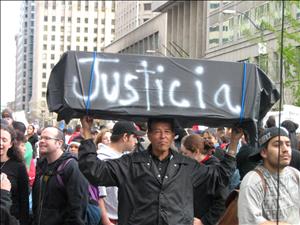In December 1999, Comite Pro-Amnistia General Y Justicia Social is organized as a grassroots organization in Seattle to draw attention to the plight of immigrant laborers in Western Washington. The group comes together immediately following the massive protests against the World Trade Organization (WTO) that occurred in Seattle in late November 1999. Initial organizers include members of CASA Latina, LELO (Legacy of Equality, Leadership, and Organizing), the Northwest Immigrant Rights Project, and the Carpenters' Union. One of the organizers' key considerations is lack of representation within the WTO protests of Latinos, Chicanos, and the immigrant community in general. According to organizer Carlos Marentes, the group will work at first as a loose coalition and later, in April 2000, will form as an official organization. The organization will further ally itself with faith-based organizations, organized labor, and civil rights groups to give a marginalized Latino immigrant community a voice in organizing for social justice.
Immigration Reform and Social Justice
The group itself noted that it was a Latino organization "which struggles to achieve a comprehensive immigration reform for all working immigrants and fulfill the dream for social justice." Furthermore, the group states, "[o]nly in this form will this country will be able to truly recognize the contributions of immigrants and be consistent with its own history" (Comite Pro-Amnistia General Y Justicia Social).
The organization evolved as one with a three-pronged structure that included social non-profit organizations, labor unions, and religious groups working alongside each other. Key organizers included Carlos Marentes, LELO activist Ricardo Ortega, and Jorge Quiroga. Comite Pro-Amnistia General Y Justicia Social has a board that institutes policies, and a rather decentralized structure.
It sponsored its first May Day march for immigrant rights in 2000. The march of about 700 participants took place in Bellevue.
Immigrant Rights in 2006
The spring of 2006 witnessed the development of a mass immigrant-rights movement throughout the nation in response to House Resolution 4437, debated in Congress, which would have instantly criminalized all undocumented persons, as well as persons who offered them humanitarian aid. The mass mobilizations resulted in huge marches in cities from Los Angeles to New York to Atlanta.
In Washington, Comite Pro-Amnistia y Justicia Social took the lead in organizing various events throughout the year. The first major immigration rights march was organized on March 18, 2006, in Seattle. The march, which received little attention in the press, had participants numbering anywhere from 2,000 to 4,000.
In March 2006 activism emerged in the Yakima Valley when more than 500 students walked out of Davis and Eisenhower high schools. Walkouts also occurred in the Columbia Basin and in South Seattle. On April 2, students marched in Yakima in support of immigrant rights.
On April 5, 2006, university and college students at the University of Washington, Western Washington University in Bellingham, Central Washington University in Ellensburg, Yakima Valley Community College, and Columbia Basin Community College organized marches and teach-ins at their respective schools. The Chicano organization MEChA (Movimiento Estudiantil Chicano de Aztlán) brought resolutions to their respective student governments in support of immigrant and student rights.
Organizers called for a National Day of Action on April 10, 2006. On this day, marches were organized simultaneously across the country. Seattle hosted one of the largest nonviolent marches in its history, with approximately 50,000 participants filling the streets. According to The Seattle Times, the march registered zero arrests. Among the organizations participating was the Northwest American Indian Movement.
A second march was held on May 1. It registered approximately 60,000 participants and coincided with a national one-day boycott of all goods. The boycott received support in Latin America as news of the movement made the international press.
The groundswell of opposition to H.R. 4437 succeeded in stalling the bill's progress through Congress.
A Movement Continues
Though H.R. 4437 died in Congress, members of Comite Pro-Amnistia General Y Justicia Social assert that more sophisticated crackdowns have continued against communities opposed to current policies. Operation Return to Sender was the name of a massive sweep of immigrant communities initiated by Immigration and Customs Enforcement (ICE) on May 26, 2006, within a month of the large demonstrations. ICE conducted raids on and deportations of immigrant workers that activists contend have separated many families and produced an atmosphere of fear in Latino communities.
The current (2007) work of Comite Pro-Amnistia General Y Justicia Social involves collaboration with the Seattle Archdiocese, Washington State Jobs with Justice, MEChA, Hatefree Zone, and others.

